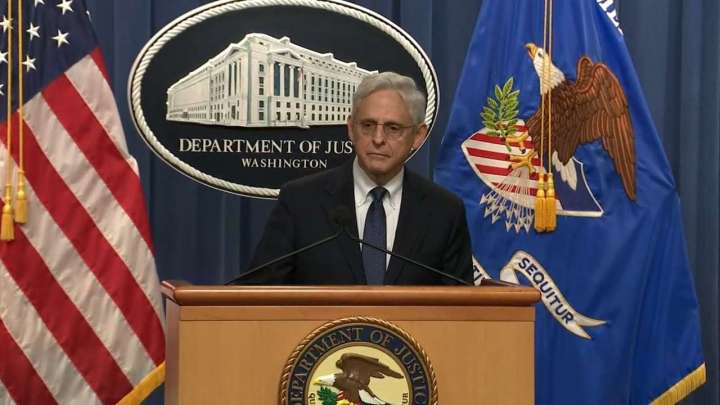From virtually the moment former president Donald Trump expounded on the execution of a search warrant at Mar-a-Lago and his GOP allies joined him in instantly crying foul, there has been a disconnect: A bunch of people immediately claimed this was a very bad thing, even as they (mostly) knew next to nothing about it.
Merrick Garland seeks to call Trump’s bluff

What if the evidence behind the search was damning? How could you know the search went too far if you don’t know what it was about? Otherwise, it sounds a lot like saying a former president is above the law.
Trump himself could shed a lot of light on this alleged miscarriage of justice, it was noted repeatedly, by disclosing the search warrant. But three days later, he still hasn’t done so.
On Thursday, Attorney General Merrick Garland decided to put the ball more explicitly in Trump’s court.
In a news conference, Garland announced that the Justice Department would seek to unseal the search warrant. But in doing so, the department made clear — repeatedly — that this wasn’t a decision it could make unilaterally. In a court filing, it emphasized that Trump could object.
“In these circumstances involving a search of the residence of a former President, the government hereby requests that the Court unseal the Notice of Filing and its attachment (Docket Entry 17), absent objection by former President Trump,” the Justice Department said.
It reemphasized at the end of the filing that “the former President should have an opportunity to respond to this Motion and lodge objections, including with regards to any ‘legitimate privacy interests’ or the potential for other ‘injury’ if these materials are made public.”
That Trump could object is a matter of course. But the fact that the Justice Department chose to drive that point home to him — and even go this route in the first place — is important.
The pushback against the search warrant on the right put the Justice Department in an unenviable spot: It almost never comments on ongoing investigations, but this is a matter of significant public interest and is already the subject of plenty of very uninformed criticism.
From there, it could set aside protocol and make disclosures, or it could say nothing and let its critics drive the messaging, including with continued false and baseless accusations.
There was also the matter of whether Trump’s lawyers even had the warrant. Public comments from one of his lawyers suggested his legal team was in possession of a copy, but a Fox Business reporter has called that into question. The filing Thursday effectively negates that.
From there, it’s up to the Trump team to decide whether to sign off — or not.
On the one hand, there might be things in the warrant that Trump quite logically doesn’t want people to know. But if his lawyers object — even to the disclosure of limited details — it will look like they’re obscuring something, which will undermine their side’s pushback. That could also give allies some heartburn, for fear of what they don’t know.
(The New York Times reported Thursday that some Trump allies are warning some Republicans against overzealously criticizing the FBI and Justice Department, because damaging information might be coming out that would reflect poorly on those criticisms.)
On the other hand, Trump could just let it all come out — something he hasn’t appeared apt to do thus far. That could reshape this entire conversation — one that’s been much more fruitful for Trump in the abstract, because he didn’t have to account for the actual details. Greenlighting the release would force a true reckoning over precisely what he or someone else might have improperly removed from the White House.
And unless this were to progress to a criminal case, it’s not clear we would ever learn what’s in the warrant. So Trump would be allowing the release of something that might not otherwise ever see the light of day.
Trump has until 3 p.m. on Friday to decide whether he’ll oppose unsealing the documents.
Whatever the case, this seems to put the Justice Department on significantly firmer ground than in 2016. Back then, concerns were raised about FBI Director James B. Comey’s unorthodox disclosures about the Hillary Clinton email server investigation — something Clinton allies later blamed for her loss to Trump.
Comey was effectively pushed into a corner, just as Garland was this week. On Thursday, Garland effectively pulled Trump into the corner with him.






